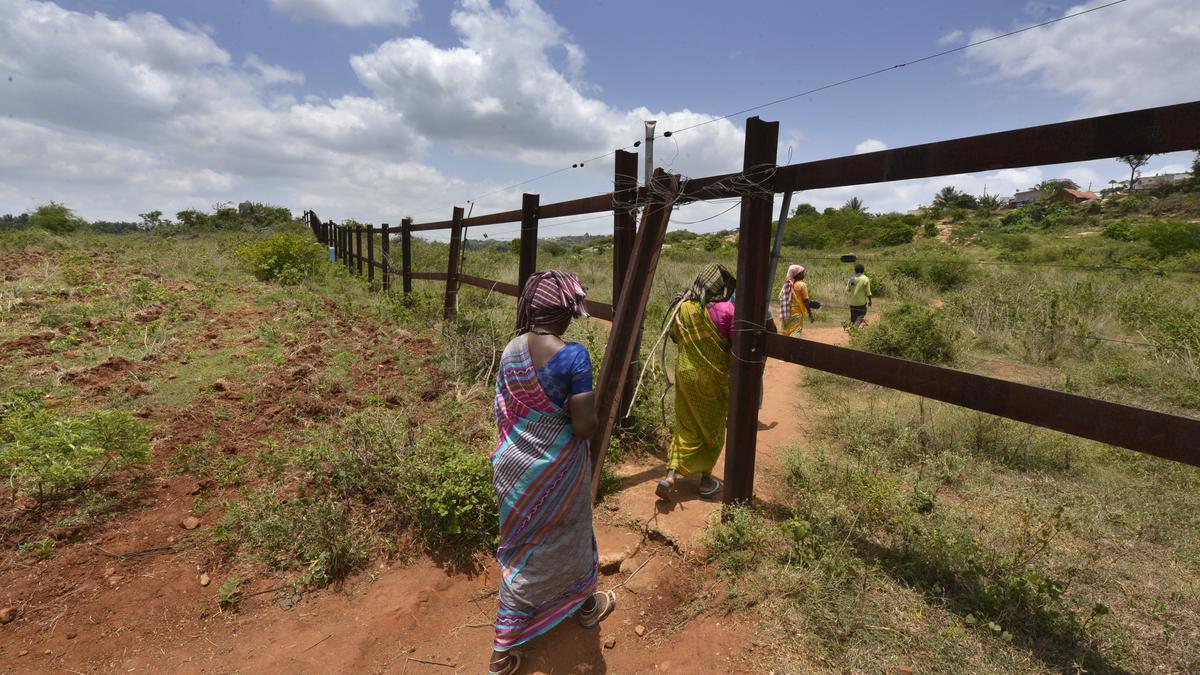
The right to stay connected to the forest Premium
The Hindu
Division, 74, of the Hakki Pikki tribe, holds a land title deed to a two-acre plot given by the Karnataka govt. after six decades of struggle. The Wildlife Act, 1972, and BNP's declaration as a National Park led to criminalisation of these communities. Activist Madhu Bhushan found a 1962 document denotifying 350 acres of forest land. MP D.K. Suresh forced the Forest Dept. to hand over the files to the Revenue Dept. On Aug. 12, 114 families were given title deeds. Disagreements over land allotment and regularisation of the colony remain. Villagers seek access to govt. schemes, better education and health facilities, and restoration of their organic relationship with the forest.
Division, 74, has finally found peace after the struggle of a lifetime. He proudly holds up the land title to a two-acre plot the Karnataka government has given him. Division — named after the sub-division office he was born next to, a naming convention common in the Hakki Pikki tribe to which he belongs — is among 114 people to have got land title deeds on August 12. He is one of the elders of the Hakki Pikki colony, located on the edge of the Bannerghatta National Park (BNP), about 36 km from Bengaluru, Karnataka.
The paper he holds came after over six decades of struggle of the Hakkipikki people, traditionally a semi-nomadic tribe of bird catchers and hunters, who settled down in this region sometime during the rule of Mysore Wadiyars, more than 100 years ago.
Krishnappa, 65, a member of the Iruliga tribe, also nomadic people and forest produce gatherers, is the president of the Hakki Pikki and Iruliga Tribal Society. He says it was in 1962 that the Government of Karnataka allotted 350 acres of land for them to sustain themselves through agriculture.
“Our fathers and grandfathers divided this land among themselves and since then we have been growing ragi, avarekayi (hyacinth beans), horse gram, maize, and mustard among other crops. But for the longest time, the Forest Department claimed we were encroachers. We did not have titles of the land we tilled all our lives,” says Krishnappa, as he presides over the society’s weekly meeting in the colony. He adds that this created several hurdles in accessing government schemes, crop loss packages, and compensation for deaths caused due to elephant attacks, among others.
Thus began the fight to secure land titles, which the community also sees as a validation of their identity. What worsened the situation was the Wildlife Act, 1972, and Bannerghatta wooded area being declared a National Park in 1974. This led to the criminalisation of these communities living on the edges of the forest.
“The 1970s and 1980s were hell for us. We were branded encroachers and thieves for going into our forest and even taking firewood. I remember one night very clearly. Forest guards barged into the village, banged on every door, threw chilli powder at many, beat us up — even children, women, and the seniors,” recounts Sakamma, in a quivering voice.
“I have fought a long battle, met every Chief Minister, voted for them with the hope they would solve our issues, but nothing came of it all. What sustained us were a few good officers, who were sympathetic to us. Once there was a drought and many of our families had migrated. Using this situation, the Forest Department wanted to bulldoze the village. Tipped off by a sympathetic officer, we got a few Iruliga families to settle in the village,” Division recalls. That is how Iruligas and Hakki Pikkis came to live together in the village.











